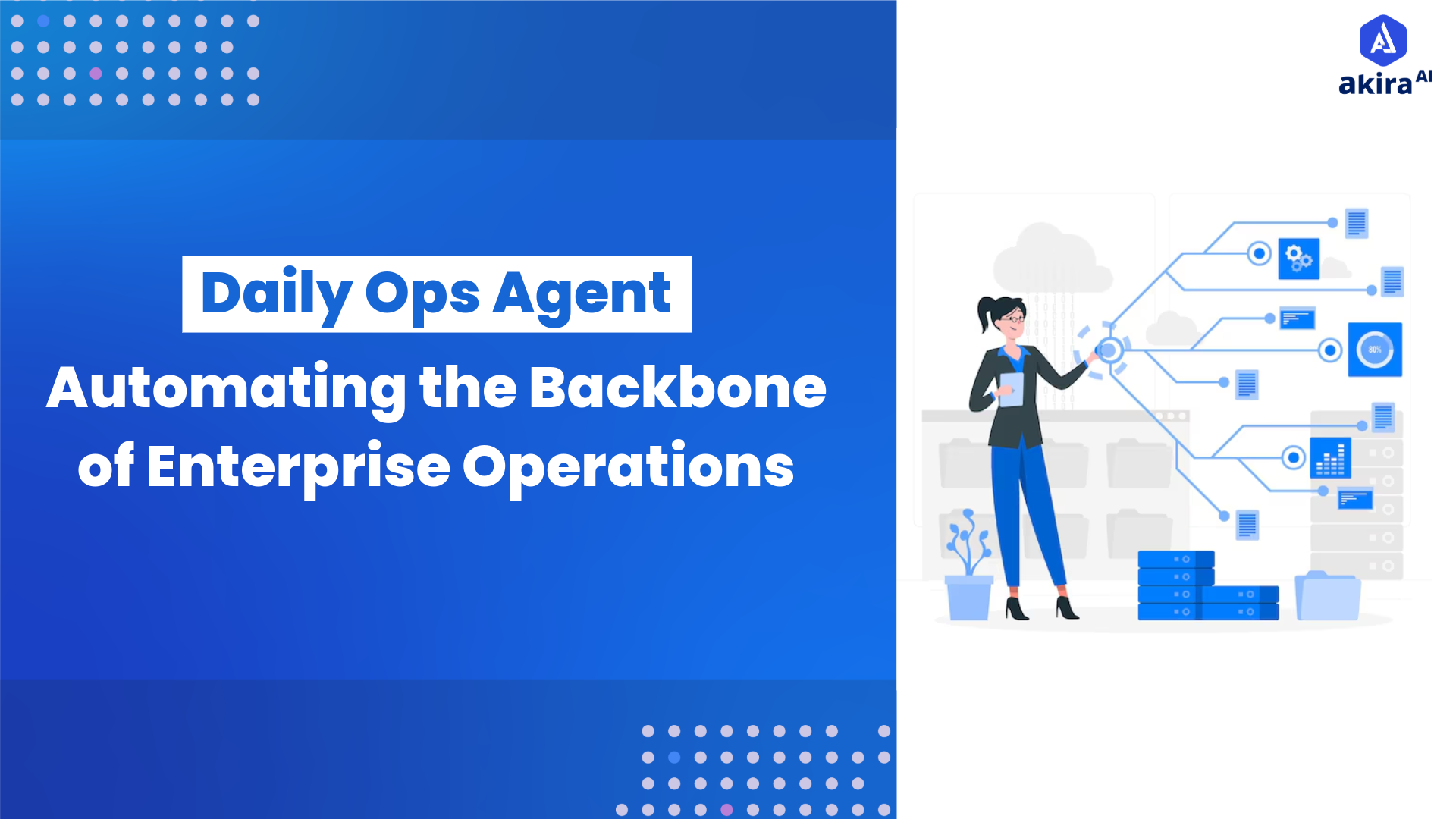Architecting The Daily Ops Agent: A Python LangGraph Approach
The design of architecture is necessary to construct an effective and smart Daily Ops Agent. The aim is to establish a tool that will be smart enough to coordinate the communications between different platforms such as ITSM, project management, and CRM. The recourse is to the use Python and the Langchain - Langgraph framework which is a strong library that enables the construction of agents that can reason and interact in a multi-step complex manner. LangGraph, which is an extension of LangChain, offers the possibility of defining stateful multi-actor applications, or, in other words, is a perfect fit for the Daily Ops Agent.
On a macro level, the agent will act as an array of nodes that are interlinked, and each one performs a particular task. As an example, we may have an automation node to observe new ITSM tickets, another one to create Jira tasks and another one to update Zoho CRM records. LangGraph enables the system to specify the information-flow and control among these nodes so that the agent may act in the right order and the agent can adapt to different situations. Such modularity does not only make the development easier but also makes the agent more scalable and maintainable.
Python and LangGraph
Python LangGraph is particularly well-suited for this task due to its ability to manage conversational flows and agentic reasoning. Instead of simple, linear scripts, LangGraph enables the system to design agents that can:
-
Maintain State: The agent remembers past interactions and the current context, allowing for more intelligent decision-making.
-
Handle Multiple Tools: Each node can leverage specific tools (e.g., API calls to ServiceNow, Jira, or Zoho) to perform its designated function.
-
Facilitate Human-in-the-Loop: While the goal is automation, LangGraph can be configured to allow for human intervention when complex decisions or approvals are required.

Figure: Simplified Agent Architecture
Standard Authentication with OAuth2
Sensitive data on operations should be handled with a lot of security. OAuth2 will be used to authenticate the Daily Ops Agent with several tools and services (ServiceNow, Jira, Zoho). OAuth2 is a common and industry-standard authorization protocol, which offers a secure, effective mechanism that resorts to ensuring the agent can access its defensible resources without ever possessing user credentials, not once. Instead, it operates with access tokens that are revocable and temporary, making security risks much less.
There are several important steps for implementing OAuth2 protocol: registering the project in every service provider its employees will work with, getting a client credential, and only after that, requesting and managing access tokens in its program. The strategy keeps the agent of Daily Ops working in a secured perimeter keeping valuable operating information of an organization at its place.
Implementation Considerations and Best Practices
Building a Daily Ops Agent is an iterative process. Here are some best practices to ensure a successful implementation:
-
Start Small, Scale Big: Begin by automating a single, well-defined workflow. Once successful, gradually expand the agent’s capabilities to include more integrations and complex scenarios. This iterative approach allows for continue the system learning and refinement.
-
Define Clear Workflows: Before writing any code, meticulously map out the workflows one intend to automate. Understand the triggers, actions, and data transformations involved. This clarity will guide the organization's agent’s design and prevent costly rework.
-
Version Control: Use Git for version control to manage the organization's agent’s codebase. This allows for collaborative development, easy rollback to previothe system versions, and a clear history of changes.
-
Security First: Always prioritize security. Follow best practices for API key management, secure authentication (like OAuth2), and data encryption. Regularly review and update the organization's security measures.
-
Documentation: Document the organization's agent’s architecture, workflows, and configuration. This is essential for future maintenance, troubleshooting, and onboarding new team members.
The Future of Daily Operations: A Connected Ecosystem
The Daily Ops Agent is more than just a piece of software; it’s a paradigm shift in how businesses approach operational efficiency. By seamlessly connecting ITSM tickets, project tasks, and CRM updates, it creates a unified, real-time ecosystem where information flows freely, decisions are informed, and actions are synchronized. This level of integration fosters greater collaboration, reduces operational friction, and ultimately leads to a more agile and responsive organization.
Imagine a scenario where a customer issue reported in Zoho CRM automatically creates an ITSM ticket in ServiceNow, which then triggers a related development task in Jira. As the development task progresses, updates are automatically written back to the ITSM ticket, and the customer’s CRM record is updated with the latest status. This end-to-end automation, orchestrated by the organization's Daily Ops Agent, transforms reactive problem-solving into proactive operational excellence.
As businesses continue to navigate the complexities of the digital age, the demand for intelligent automation solutions will only grow. The Daily Ops Agent, built with flexible technologies like Python LangGraph and deployed with the portability of Docker, represents a significant step towards achieving true operational harmony. It’s about empowering the organization's teams, delighting the organization's customers, and building a resilient, future-ready enterprise.
The Dawn of Seamless Operations
Integrating a Daily Ops Agent is a smart step toward the future of business operations. By automatically managing ITSM tickets, project tasks, and Zoho CRM updates in real time, companies can achieve new levels of efficiency, accuracy, and responsiveness that weren’t possible before.
This isn’t just about automating individual tasks—it’s about creating a connected and intelligent operational system. In this system, every update, task, or ticket feeds into a clearer and more complete understanding of how the business is running.
The Daily Ops Agent shows how intelligent automation can help teams move away from reactive problem-solving and instead work proactively and strategically.
The future of day-to-day work is already here. It’s seamless, human-centered, and fully integrated—ready to move your business forward.




